- Home
- Juliet Marillier
Seer of Sevenwaters Page 21
Seer of Sevenwaters Read online
Page 21
“Not old, just wise,” Sibeal says.
“Did you rest well, Sibeal?” I ask, though I can see the answer is no.
She shivers. “I would say my dreams were unwelcome, but I expect there is some wisdom to be gleaned from them. They were dark and confused; it will take me time to work out their meaning. Did they bring Rodan’s body back, Gull?”
Gull nods, somber now. “Johnny wanted me to ask you if you’re sure about performing the rite tomorrow.”
“Of course.”
“For now,” says Gull, “I’m under instructions to make sure you eat and drink. Biddy has something set aside for you.”
“I’m really not hungry.”
“The strictest of instructions, from your sisters. You need not walk down to the kitchen. I can fetch your supper for you.” Gull glances at me. “Ardal wants to talk to you on your own. If you’re agreeable to that, I’ll take time for a drink and a chat with Biddy before I come back. If you’re not agreeable, I’ll put my head out the door and whistle someone up.”
“Thank you, Gull. We’ll be fine by ourselves.” She’s looking into the flames, her eyes suspiciously bright. Holding back tears? What was in those dreams?
We are silent awhile when Gull is gone. The fire flickers; the shadows move; the night wind rattles the shutters.
“What did you want to talk about?” she asks, her voice small and tight.
I expected her to seek explanations. Why did I warn her not to go out alone? Why would I take it upon myself to say such a thing? I have no good answer ready; I cannot tell her what Knut said. She would go straight to Johnny, and Johnny would confront Knut, and in one form or another, disaster would follow. Knut will stop at nothing to keep me from talking. Whatever lies behind this veil of forgetting, it must be powerful indeed. The only way I can keep Sibeal safe is by leaving Inis Eala. I am not strong enough yet, but Gull will help me. He trained Knut to expertise with the sword in seven days, after all. Surely he can train me to walk, to run, to be my own master again. Then I will go. I had planned to tell her I have decided this. Instead I say, “You talk, Sibeal. I will listen.”
So she tells me: the vision she had of a falling man, seen over and over before it came true, and how she did not act until it was too late. She describes the dead man down on the rocks, his head broken open. She doubts that she should perform the burial rite, although she has already agreed, for she thinks perhaps she is not fitted for the calling of a druid after all. Inadequate. Confused. These are only some of the things she calls herself. I sit silent, listening.
“How can I do it?” Sibeal asks, not expecting an answer from me. “How can I go out there and speak prayers over the body of a man who, but for my lack of insight, might still be alive today? All I needed to do was talk to someone, describe the man in the vision, work out who he was and warn him. But my mind was on other things, and I didn’t tell anyone. What would Ciarán think of me?” I see something remarkable: tears spilling from her eyes and flooding her pale cheeks. She seems unaware of them. “Ardal, I know the Sight does not always show the truth. It doesn’t predict the future or reflect the past—it shows us images we can put together to make answers. You understand that, don’t you? Oh, gods, now it sounds as if I’m making excuses . . . I can’t get past the belief that this is my fault. That I was warned so I could stop it from happening and that I was too slow to act. What would Rodan’s family think if they knew he would be laid to rest by the person who let him die? Why can’t I get this right, Ardal, why?” She turns her brimming eyes on me, then buries her face in her hands.
I am up, on my feet. I take four steps and sit down on the bench beside her. My heart is pounding, a drum for dancing. My arms go around her shoulders. She turns toward me and presses her face against my chest. I hold her; she weeps. I remember all the things I said to her last night, and I am ashamed of myself.
We sit for some time thus. I am hoping Muirrin does not decide to come back with Gull to check on Sibeal’s welfare. Our pose could be that of a brother comforting a sister; it is quite chaste. My thoughts, however, are not those of a brother. Gull has seen this already. I raise a hand to stroke Sibeal’s hair, fine, rippling hair, as dark as a crow’s wing. She is like a girl from an old tale, a forbidden princess, an enchantress in a mysterious wood. She is the rarest creature I have encountered in all my life. Even in the lost part, the part I cannot remember, there can surely have been nobody like her.
“Hush,” I murmur. “There, now.” And after a while I hum a tune, as if I were lulling a child.
“Ardal,” she says, her voice muffled against my shirt. A clean shirt; I thank Gull for that.
“Mm?”
“What is that song?”
“A lullaby. I will call a hundred larks from the meadow, to sing my little one to sleep. I will call a hundred owls from the dark forest, to watch over my little one’s cradle. I will summon a hundred stars from the heavens, to light my little one’s dreams.” My mother’s voice comes to me, singing in the Norse tongue, and I see her blue eyes with their tilted corners, her flaxen braid coiled like a golden crown around her head, her linen apron with its rows of red embroidery, houses and horses and trees. I learned both tongues from the cradle, Brezhoneg and Norse. No wonder I have a facility for translation. I would like my mother to meet Sibeal, but I know this will never happen.
“What a lovely song. Gods, I didn’t know I had so many tears in me.” She sits up; withdraws her arms from around my waist. I release her. It feels like giving up my heart. But perhaps that is already lost.
Sibeal is delving for a handkerchief. She finds one tucked into her belt, wipes her eyes, struggles to compose herself. Even with red eyes and streaming nose, she is beautiful. Suddenly she sits straight, staring at me. “Ardal! You walked by yourself!”
So I did. Only now do I realize it. “Four steps,” I say, feeling my mouth twist. “A true feat of strength.”
“You did something you couldn’t do before. Four steps today, perhaps eight tomorrow. Evan did say it might be midsummer before you are well enough to travel. I’m truly proud of you, Ardal.”
And now I can no more tell her I must leave the island than I can summon the hundred stars I sang of. I should go away. I must go. I am the ill luck man, bringer of doom and destruction. I am the one who should have drowned with the ship; I am the one who should have fallen from the cliff. But I live, and every moment I am here I put her life at risk. Say it, Felix. I cannot. For tonight, let me pretend that I can stay here. Let me pretend that I can hold her in my arms again; let me dream of a future with the two of us in it, together. Let me believe in miracles.
CHAPTER 8
~Sibeal~
Rodan was buried among the island’s own departed, who lay in an area sheltered by a dry-stone wall, on a rise with a fine view westward over the sea. A message had been sent to his chieftain in Connacht, carried by a man from the mainland settlement. As for Rodan’s comrades, they would stay and see out the full period of their training. All of them said that was what he would have expected.
Too much death. Too much unease. Each morning I got up, intending to walk to the seer’s cave and spend the day in meditation and prayer. Each morning I found a reason not to go: Clodagh had a sore back; Muirrin was busy with injured men and needed help; the garden had to be weeded; I should be keeping an eye on Ardal, who had developed a sudden fierce will to be strong again and was inclined to exhaust himself working too hard at it. He could walk out into the garden now, and sit in the sun watching as I dug and pruned and harvested. Whether he had remembered any more of his past, I had no idea. He had gone very quiet, even with me.
In this manner days passed, days in which I became more and more aware of the mutterings in the community about ill luck and who might have brought it to Inis Eala. Now every accidental fall, every dispute, every small reversal seemed to reinforce the belief that an evil had come among them. Johnny told me that the foolish talk would pass, and that I should not le
t it concern me. My sisters dismissed it. Cathal’s mouth grew tighter, his face paler as he heard it. His eyes were haunted. I knew he was thinking about his father.
To reach the seer’s cave I must go past the place where Rodan had fallen. I could not put off the expedition forever. On a clear, bright morning I set out with my provisions and my warm cloak, and Fang in attendance. I would go to that place on the cliff top and offer prayers for Rodan’s spirit. Then I would walk on to spend the day in Finbar’s sanctuary. I would seek a wisdom higher than that of humankind.
Fang’s behavior had grown still odder. She would run a short distance, then halt as if turned to stone, her muzzle pointed out to sea. When she was in this pose, the dog was impervious to all else. There was no point in calling her. Even passing sheep were ignored. Then, abruptly, Fang would come back to herself and run after me as if nothing had happened. “What is it, little dog?” I asked her as we followed the track toward the cliffs. “What do you see?” But the only reply was the rush of the waves below us, and the high calling of the birds.
Fang’s erratic pace made the walk slower than it might have been. I was sufficiently concerned for her welfare not to go so far ahead that the dog might lose sight of me. Then again, perhaps I was a coward. Perhaps my feet were dragging because I did not want to reach that place where Rodan had gone over. I gritted my teeth and walked on.
I rounded a corner with the dog at my heels and my heart faltered. A naked figure stood poised, arms stretched out as if for flight, bare feet on the very edge of the cliff. Her hair streamed in the wind; her eyes were fixed on the horizon, away to the north. Svala, like a lovely carven figurehead. If I made a sound, if I startled her, she would fall. She was standing in exactly the spot where Rodan had gone over.
Fang had no such scruples. She pushed past me, trotted ahead along the path and stopped to sniff at the heap of clothing Svala had abandoned on the ground.
“Svala,” I said in a murmur. “Step back from the edge.” Even as I spoke, my mind showed me an image of her falling.
She turned, gloriously confident of her balance, and walked over to the path. She stooped to pick up her gown. My heart was pounding, my palms clammy. I forced myself to breathe.
“You frightened me,” I said. “I thought . . . ” No, I would not tell her what I had thought, for it was obviously wrong. She’d had no intention of jumping. I saw that in her proud stance and in her calm eyes. “Never mind,” I said, knowing she could not understand.
Svala donned gown and shawl. She did not seem to have shoes with her. Once dressed, she moved to one side to let me pass on my way to the cave. It was not until I had gone some distance along the track that I realized she was following me, steady and silent, a few paces behind.
Logic said, She’s big, she’s strong, she’s unpredictable, and the path is narrow. Instinct said, Walk on, so I did, even though it became apparent when I turned to look that Fang was not coming with us. We reached the opening that led to Finbar’s cave. I slipped through, making my way along the narrow, dim tunnel, and Svala came after me, quiet as a shadow. I should have been frightened, perhaps. But it felt right that she was here with me. It felt like a turning point.
Wild creature that she so often seemed, Svala understood from the first why I was in the cave. A moment after I settled cross-legged by the still pool, she was there by my side, back straight, hands loose in her lap, eyes on the water. She stayed beside me as I went through my slow patterns of breathing; as I spoke prayers, repeated passages of lore and waited for the wisdom of the gods. Not a sound did she utter. Not a move did she make.
My preparation was long. I waited until the sun struck down through the opening above the water, filling the shadowy cavern with gold. The pool became a vessel of light. Now. Now was the time.
I gazed upon the surface and in my mind I said: I was led to save Ardal’s life so he could fulfill a mission. The runes seemed to confirm it. Both of us believed it was urgent that he remember and act. But he will not tell what he has remembered. It seems to me that this silence makes the whispers louder, the talk of an ill luck man. That sets a shadow on everyone. How will the truth be known?
Nothing. Nothing at all but the light on the water and the steady sound of Svala’s breathing. All this time she had kept watch beside me. I waited, and it seemed to me the cave grew quieter, and the water clearer, as if it had nothing at all to show. The gods were silent. Even Finbar would not help me. It was all too easy to supply my own answer. You are distracted. Your mind strays all too easily. As a seer, you are becoming unreliable.
Svala’s hand closed around my arm. After so long in trance, I jumped at her touch like a startled hare. My heart raced. I glanced across, and she met my eyes, putting a finger to her lips. Shhh. Still holding on to me, she turned her gaze back on the pool, and after a moment I did the same.
Something was stirring on the water’s surface now. A vision was taking form. Waves crashing onto rocks; a ship tossed about by monstrous seas. Even as I saw it in the water, I felt the decking shudder under my feet, the whip of salt spray, the bruising thump of folk thrown this way and that. A gale. A storm. A tempest, sweeping the vessel before it like a scrap of debris. A powerful dread gripped me; it fettered me more tightly than Svala’s strong hand. This will destroy us. No man can survive such a storm . . .
And then, land. Rearing up with a dark inevitability, land. A craggy island, a lonely mountain rising from the sea, wearing a white skirt of breakers. The ship barreled forward, propelled by the surge. In my mind, men were screaming, cursing, calling to their gods to save them. The vessel plowed on, and now I could see a narrow opening between two rocky headlands, and beyond it a bay, and a strip of level, pebbly shore. To oars! someone shouted.
There was a juddering, a shivering, and the ship’s course changed. Not straight for the rocks now, but toward that gap, heading for safe water. Pull! Pull! The vessel entered the narrow passage, the rocks so close I could see the shellfish clinging to the dark surfaces. Monstrous cliffs loomed to either side; the boat was in shadow. Pull! And then we were in the bay, the rowers gasping with effort, the ship slowing as they rested their arms. Safe. Oh gods, safe at last.
Like a bolt of lightning from a clear sky it comes, rearing out of the water right by the prow, taller than an oak tree, taller than a castle tower. Its eyes are bright with malice, its claws sharp as scythes, its mouth . . . Oh, its mouth lined with long white teeth, and its slavering, blue-green tongue . . . Its neck snakes from side to side. Looking, choosing: Which will I take first? Men scream. They scramble for crossbows, spears, knives. Pull! yells someone with more presence of mind than the others, and the crew takes up oars, turning the ship in an attempt to evade the beast. The creature’s monstrous head whips down to deck level; its foul breath sets us choking and gasping. It toys with us awhile, moving one way, the other way, so the ship cannot pass. It slaps the water with its tail, making great waves. Pull! Pull! One man, at least, keeps his terror in check. Closer to the shore now, closer still and . . . A scream like ripping cloth as the creature reaches out a forefoot and, with a stabbing movement, plunges its claw through a crewman’s chest, impaling him. It tosses him high, opens its jaws, catches him as he falls and, in a convulsive gulp, swallows him whole.
Breathe, Sibeal. The vision faded to shreds and fragments; the boat on an erratic course toward the shore, wild-eyed men rowing with the strength of sheer terror; the water-beast opening its long-toothed mouth to show a welter of bloody flesh and splintered bone, then reaching out for another hapless crewman. Before I could see him taken the vision was gone, and there was nothing but the calm water of the seer’s pool, golden under the midday sun. Breathe. Use what you have learned.
My gut twisted in revulsion, my skin crawled, my heart shrank from the horror of it. I breathed. I prayed. I worked on not being sick. When I could move, I turned to Svala, who had taken her hand from my arm and was waiting, silent, beside me. The look on her face shocked me. Svala wa
s smiling. Her eyes were full of light, as if what she had seen had uplifted her and made her joyous. Perhaps her vision had been quite different from mine. Perhaps the gods had granted her a glimpse of happier times, before she came to Inis Eala, before she suffered the loss that broke her heart.
I reached for my water skin, took out the stopper and drank deeply. I offered it to Svala, but she pushed it away. Making a cup of her hands, she took water from the seer’s pool, lifting it to her mouth to drink. I was shocked; it seemed an act of sacrilege.
Svala was trying to tell me something, gesturing. The pool; herself—fingers tapping her breastbone with some force—then a sweeping movement toward the cave entry. The pool again, herself, then me, then a mime that was unmistakably of rowing. I want to go. I must go there. You take me.
“You can’t mean that,” I breathed. “You can’t.” Go to that place of monsters and impossible waves? Svala and me, rowing beside each other? I must have misunderstood. But then, if she had seen a different vision, perhaps she was asking to go somewhere else, somewhere she could not describe to me. I want to go home. Back to the place I come from.
“You will go home, Svala,” I said, ignoring the talk I had heard in the dining hall, about Knut perhaps being invited to stay for a trial period on Inis Eala, where his superb combat skills would be an asset. “You and Knut. Johnny can arrange for you to go as soon as he’s satisfied that you’re well enough.” I wondered about that. One could not describe the strapping Svala as unwell, but she was not as other women were, and I could understand Johnny’s reluctance to send her over to the mainland settlement or beyond. I could not see her living her life in any ordinary village or indeed any ordinary household. Knut did his best to protect her, but he could hardly do so all the time, and she had the capacity to wreak havoc. “A ship, yes. A voyage to . . . the place you set out from. Ulfricsfjord. Not with me. With Knut. Your husband.” That, I could not mime, but I hoped she would recognize the names.

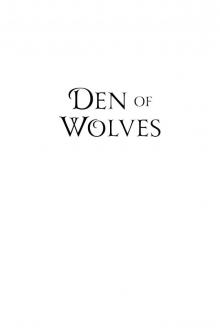 Den of Wolves
Den of Wolves Flame of Sevenwaters
Flame of Sevenwaters Blade of Fortriu
Blade of Fortriu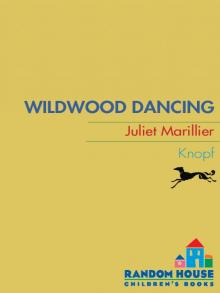 Wildwood Dancing
Wildwood Dancing Dreamer's Pool
Dreamer's Pool Raven Flight
Raven Flight Heir to Sevenwaters
Heir to Sevenwaters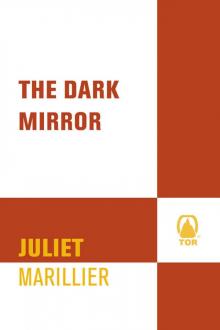 The Dark Mirror
The Dark Mirror Daughter of the Forest
Daughter of the Forest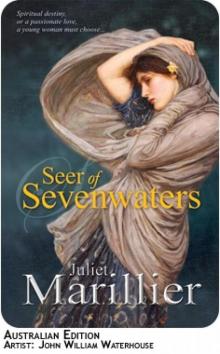 Seer of Sevenwaters
Seer of Sevenwaters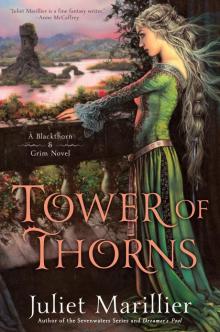 Tower of Thorns
Tower of Thorns Shadowfell
Shadowfell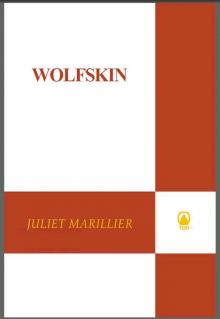 Wolfskin
Wolfskin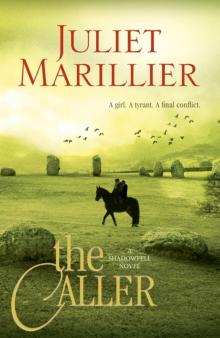 The Caller
The Caller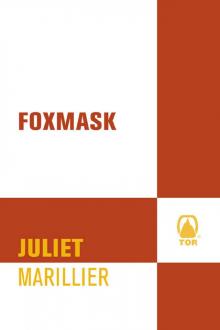 Foxmask
Foxmask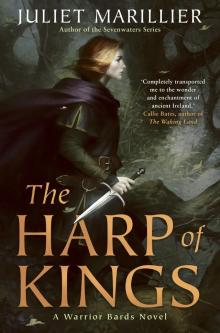 Harp of Kings
Harp of Kings The Well of Shades
The Well of Shades Heart's Blood
Heart's Blood Child of the Prophecy
Child of the Prophecy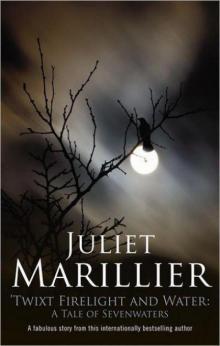 Twixt Firelight and Water
Twixt Firelight and Water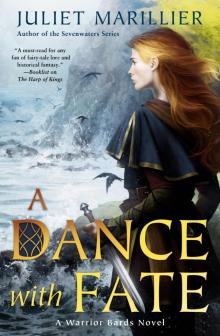 A Dance with Fate
A Dance with Fate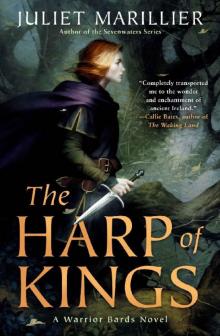 The Harp of Kings (Warrior Bards)
The Harp of Kings (Warrior Bards)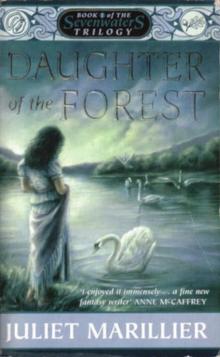 Daughter of the Forest (The Sevenwaters Trilogy)
Daughter of the Forest (The Sevenwaters Trilogy)![Sevenwaters [06] Flame of Sevenwaters Read online](http://i1.bookreadfree.com/i2/04/08/sevenwaters_06_flame_of_sevenwaters_preview.jpg) Sevenwaters [06] Flame of Sevenwaters
Sevenwaters [06] Flame of Sevenwaters![[Sevenwaters 04] Heir to Sevenwaters Read online](http://i1.bookreadfree.com/i2/04/12/sevenwaters_04_heir_to_sevenwaters_preview.jpg) [Sevenwaters 04] Heir to Sevenwaters
[Sevenwaters 04] Heir to Sevenwaters